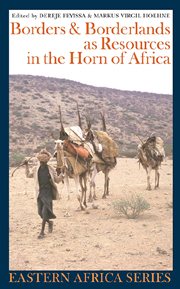Book contents
- Frontmatter
- Contents
- List of Maps, Tables & Charts
- Preface by Günther Schlee
- Editors' Preface
- Notes on Contributors
- List of Acronyms
- 1 State Borders & Borderlands as Resources
- 2 More State than the State?
- 3 Making Use of Kin beyond the International Border
- 4 The Tigrinnya-speakers across the Borders
- 5 Trans-Border Political Alliance in the Horn of Africa
- 6 People & Politics along & across the Somaliland-Puntland Border
- 7 The Ethiopian-British Somaliland Boundary
- 8 The Opportunistic Economies of the Kenya-Somali Borderland in Historical Perspective
- 9 Magendo & Survivalism
- 10 Can Boundaries not Border on One Another?
- 11 Conclusion
- Index
- EASTERN AFRICAN STUDIES
10 - Can Boundaries not Border on One Another?
The Zigula (Somali Bantu) between Somalia & Tanzania
Published online by Cambridge University Press: 05 April 2013
- Frontmatter
- Contents
- List of Maps, Tables & Charts
- Preface by Günther Schlee
- Editors' Preface
- Notes on Contributors
- List of Acronyms
- 1 State Borders & Borderlands as Resources
- 2 More State than the State?
- 3 Making Use of Kin beyond the International Border
- 4 The Tigrinnya-speakers across the Borders
- 5 Trans-Border Political Alliance in the Horn of Africa
- 6 People & Politics along & across the Somaliland-Puntland Border
- 7 The Ethiopian-British Somaliland Boundary
- 8 The Opportunistic Economies of the Kenya-Somali Borderland in Historical Perspective
- 9 Magendo & Survivalism
- 10 Can Boundaries not Border on One Another?
- 11 Conclusion
- Index
- EASTERN AFRICAN STUDIES
Summary
Introduction
A contemporary map of Africa shows clear-cut state borders all across the continent. We all know, however, that before the colonial scramble for Africa national frontiers and geographic boundaries were much less codified. Nowadays the perceptions of colonial boundaries of the people living in frontier areas are diversified; borders are subject to interpretation and cultural negotiation. Separations created by such colonial borders may not be perceived as permanent, people may feel linked beyond national frontiers, and boundaries may be created through the construction of cultural categories beyond geographical borders. Moreover, the very lines created by national frontiers may foster groupings of ethnic identity markers aggregated differently on each side, so that people can use opposite frontier areas to improve positively their own self-perception and self-esteem.
The Somali Zigula of the Juba River are one example of people who ignored modern national frontiers and regarded cultural similarities as more relevant to their identity. Language and kinship criteria in particular could be manipulated and adapted for this purpose. This chapter describes some ways in which boundaries may not border on one another and can be culturally constructed. It understands frontier areas as locations where branches of ‘positive identity’ (Epstein 1983: 185) can be experienced and lived. Refugee camps and the status of refugee may be considered frontier areas both in geographical and in metaphorical terms.
During the 1980s, when I met the Somali Zigula along the Juba River in Somalia, it was quite common among them to be careful to maintain their own Bantu-based Zigula language which they regarded as a ‘passport’.
- Type
- Chapter
- Information
- Borders and Borderlands as Resources in the Horn of Africa , pp. 169 - 186Publisher: Boydell & BrewerPrint publication year: 2010



